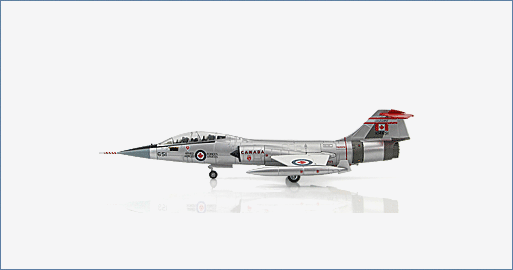Air Power Series>1:72 die-cast display model>F-104>HA1060
Lockheed CF-104D Starfighter 104651, Canadian Armed Forces

General Background
The RCAF received their first CF-104 in March 1962. Although originally designed as a
supersonic interceptor the Canadian Air Force used it primarily for low level strike and
reconnaissance. The Canadian version of the F-104 was capable of carrying a ventral
mounted Vinten Vicon pod with 4 cameras inside for reconnaissance picture taking. On
September 4, 1963 number 12900 was the 200th and final CF-104 produced and entered
service on January 10, 1964. The CF-104 retired from service in 1985 when it was
replaced by the CF-18 Hornet. Over the 25 years of active service 110 aircraft were lost
to accidents earning it nicknames like "Widow Maker" and "Lawn Dart". The RCAF CF-
104 probably had the most flying time of any variant with an average of 6,000 hours per
plane over their life time compared to the Luftwaffe's 3,000 hours.
The Aircraft
Lockheed CF-104D Starfighter C.N. 583A-5321 serial 104651 joined the RCAF as 12651
but in May 1970 CF-104Ds 12631 through 12668 were re-serialed as 104631 through
104668.
The CF-104D flew its maiden flight on June 14, 1961. No CF-104Ds were manufactured in Canada. Starfighter 12651 (104651) joined the RCAF No. 6 Squadron Strike/Recce OTU, Cold Lake, Alberta on June 26, 1963. In 1970 RCAF No. 6 Squadron became 417 Strike/Reconnaissance Operational Training Squadron. On June 24, 1980 while flying a low-level simulated missile site attack several large birds were ingested by the engines and despite pilot attempts to stabilize the aircraft the two crew members were forced to eject safely with only the loss of the aircraft. The Alberta Aviation Museum, Edmonton, Alberta, Canada acquired a former Dutch F-104D, D-5805 and has fully restored it as 104651.
The CF-104D flew its maiden flight on June 14, 1961. No CF-104Ds were manufactured in Canada. Starfighter 12651 (104651) joined the RCAF No. 6 Squadron Strike/Recce OTU, Cold Lake, Alberta on June 26, 1963. In 1970 RCAF No. 6 Squadron became 417 Strike/Reconnaissance Operational Training Squadron. On June 24, 1980 while flying a low-level simulated missile site attack several large birds were ingested by the engines and despite pilot attempts to stabilize the aircraft the two crew members were forced to eject safely with only the loss of the aircraft. The Alberta Aviation Museum, Edmonton, Alberta, Canada acquired a former Dutch F-104D, D-5805 and has fully restored it as 104651.
Specifications:
| Manufacturer: | Canadair |
| Designation: | originally a super-sonic interceptor but adapted for low level strike and reconnaissance |
| Crew: | 1 x pilot - “D” variant 2 crew |
| Dimensions: | |
| Wingspan: | 21’ 11” |
| Length: | 54’ 9” |
| Height: | 13’ 6” |
| Wing area: | 196.1 sq. ft |
| Powerplant: | 1 x Orenda Engines J79-OEL-7, 10,000 lb. s.t. dry / 15,800 lb. s.t. with after burner |
| Performance: | |
| Maximum speed: | |
| Dash: | 1,550 mph (mach 2.35) @ 40,000’ |
| 915 mph (mach 1.2) @ sea-level | |
| Climb to 30,000’: | 1.5 minutes |
| Service ceiling: | 50,000 ft (12,000 m) |
| Range: | 1,630 mi (1,420 nm, 2,630 km) |
| Weights: | |
| Empty: | 13,909 lbs. |
| Clean: | 21,005 lbs |
| Maximum take-off: | 28,891 lbs |
| External stores: | |
| 5 hard points: | 1 x under the fuselage, 1 x under each wing, 1 x at each wing tip |
| Armament: | |
| External bombs and missiles such as: | Napalm bomb |
| Cluster bomb | |
| BL755 cluster bomb | |
| 1 x 19 rocket rocket-pod | |
| Mk. 82 bomb | |
| MN1A practice bomb dispenser | |
| 1 x M61A1 Vulcan | |
| 1 x 20mm cannon added to later versions. |

